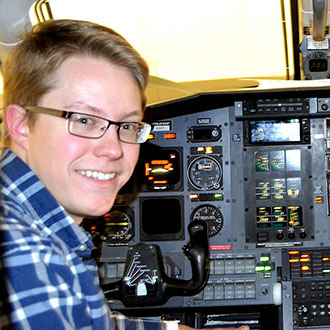Stepping Out of the Comfort Zone
For a campus that prizes creative risk-taking, Independent Activities Period is a cultural touchstone.
by Meg MurphyThis month is Independent Activities Period (IAP) at MIT, a four-week period when students, faculty, staff, and alumni organize and engage in all kinds of inventive and wacky sessions that range from relaxing to rigorous.
There are how-to sessions at which students can learn how to build a skateboard or use a ham radio; forums, films, and lectures, such as an evening on sword making or a Harry Potter Mash — all eight films playing simultaneously; and tours, recitals, and contests, where students can tour databases for molecular-level bioscience research or join a puzzle-solving competition.
For a campus that prizes creative risk-taking, IAP is a cultural touchstone. “What is really neat about IAP, and what makes it unique, is that students are encouraged to step out of our comfort zone,” says Ava Soleimany, a graduate student in the Department of Electrical Engineering and Computer Science.
“IAP is a time to try something new and explore an area you’re curious about without concern about exams and grades,” says Soleimany. She and fellow graduate student Alexander Amini have developed a one-week IAP course, 6.S191 (Introduction to Deep Learning).
“Plus it’s super neat that students have an opportunity to design and implement our own courses,” she says. “You can TA but that’s not the same. In IAP, we really have ownership over what we’re building.”
Stephen Filippone, a graduate student in the Department of Materials Science and Engineering, is on the same page. He’s teaching a session on game literacy, which involves a week of playing video games, and considering the music, art, and interactive mechanics that make them “a totally unique form of expression.”
“IAP is the reason I can even teach this class. I don’t really know much about the subject,” says Filippone. “I want to learn as I teach. I’ve told the students that. We’ll have a real go at it — and that’s an exciting prospect. It’s also risky. IAP let’s you take risks.”
And for those community members seeking intensity, IAP offers an opportunity to learn a large amount of material in a short period of time. “We go all day, everyday. IAP allows for intensive learning,” says MIT alumnus Philip Greenspun ’82, PhD ’99. “This format has proven wonderfully efficient for teaching software engineering in Course 6.”
Over three days, Greenspun and fellow pilot and alumna Tina Prabha Srivastava ’09, SM ’12, PhD ’15 will teach participants in 16.687 (Private Pilot Ground School) about the engineering and operation of airplanes, helicopters, and drones. Senior Matt Guthmiller, who flew a six-seat plane around the world at age 19, will join them.
Srivastava, a graduate of MIT’s Department of Aeronautics and Astronautics, says participants with a theoretical understanding of aerospace engineering will find flying to be revelatory. “It’s kind of like everything you learn in AeroAstro — all those lessons — comes together in the air. It all make sense,” says Srivastava. Besides, she adds, “Flying in general is an amazing thing. It’s an exhilarating experience. I’m so excited that IAP allows us to teach MIT students to fly.”
And if none of the above appeals, you have plenty of other options. Such as spending a day learning to operate the Zeiss Orion helium ion microscope, which is on the cutting edge of charged-particle imaging.
“It’s relatively hard to access this microscope in universities,” says Mark Mondol, an assistant director of the NanoStructures Laboratory at MIT. He and Karl Berggren, a professor in the Department of Electrical Engineering and Computer Science, are offering the session.
“This is an innovative tool that allows for high-resolution imaging,” says Mondol. He says people are using the microscope to image a variety of things across multiple disciplines. “We want to reach people from chemistry and biology and other fields. Show them this exciting imaging tool they can use.”
As Filippone, the soon-to-be gaming instructor, says: “IAP is a chance to broaden your horizons, if you pardon the cliche. I imagine for some students it may be the only time they get exposed to certain ideas outside of their normal coursework. And venturing out is exciting.”
